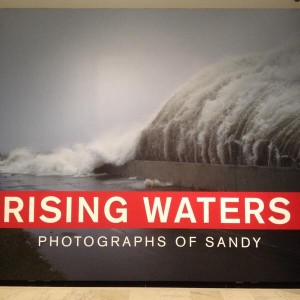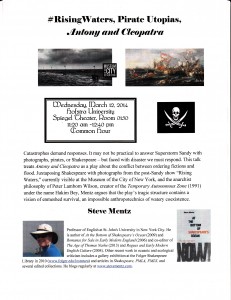 Next Wed March 12, I’ll be giving a talk at Hofstra University about flood, storms, Shakespeare, and disorderly utopias. With pictures!
Next Wed March 12, I’ll be giving a talk at Hofstra University about flood, storms, Shakespeare, and disorderly utopias. With pictures!
The talk will be held in the Spiegel Theater, Room 0150, at Hofstra University, from 11:20 am – 12:40 pm. Open to the public — please come!
Here’s a little taste out of the opening —
Catastrophes demand responses. It may not be practical to answer Superstorm Sandy with photographs, pirates, or Shakespeare – but faced with disaster we must respond. We also want to rebuild, but that’s a lesson that perhaps Antony and Cleopatra can help us unlearn. This talk seeks in Shakespeare’s Mediterranean tragedy a model of the conflict between ordering fictions and flood. It examines Shakespeare in dialogue with contemporary ecological theory and in front of a slide-show of images from hurricane Sandy, including some from the amazing Rising Waters show currently at the Museum of the City of New York. My contention this morning is that the play’s tragic structure contains a vision of enmeshed survival, an impossible anthropotechnics of watery coexistence. The titular lovers span the land-sea boundary – Antony as dolphin, Cleopatra as crocodile – but today I’ll unpack through the sea-lord Pompey a less tragic and more oblique response to the surrounding water. Utopian piracy models a risky and unstable engagement with water and land that I explore under the sign of “swimmer poetics.” It’s a way of being-in-catastrophe that leaves the taste of salt on skin, asking for porous rather than rigid boundaries. Searching for a necessary futurity within destructive change, Pompey’s mastery of oceanic flux invites us to expand the politics and poetics of flood beyond the Nile valley. The play’s structural entwining of pirate utopia and watery dissolution proposes no sustainable plan for rebuilding. Instead, it gestures toward tactics of post-sustainability for enduring catastrophic immersion.
My talk hazards the claim that this play’s urgent and doomed efforts to reconcile humanity to inhuman spaces speaks to present ecological dilemmas, and in particular to our recent floods. I assert, more in hope than anxiety, that literary criticism can develop a flexible language to respond to our new century’s rapid-fire environmental disasters. I will begin by re-reading one of the most famous speeches in the play as an ecological lament. Mark Antony’s exhortation, “Let Rome in Tiber melt” (1.1.34), floods the eternal city with a melancholy environmental vision. From an ecological view, Rome will melt into the Tiber, as New York will slide into the Atlantic – it’s just a question of time. Reconsidering catastrophic floods as violent encounters with nonhuman environments brings human bodies in intimate touch with disaster. Connecting this dramatic pattern to multiple eco-theoretical models, including Timothy Morton’s hyperobjects, Peter Lamborn Wilson’s pirate utopias, Peter Sloterdijk’s global spherologie, and Jeffrey Jerome Cohen’s prismatic ecology, I explore flood as the inhospitable matrix of Antony and Cleopatra. Pompey’s domination of the sea and his alliance with “famous pirates” such as Menas presents a fantasy of sympathetic encounters between human bodies and alien oceans. Pirate utopias are not comfortable places, and in fact they may not be places at all, in the sense of stable locations toward which we can steer ships. The utopian vision captured in Pompey’s boast, “The people love me, and the sea is mine” (2.1.9), responds to catastrophe with mobility and desire. We need Pompey’s loving cry. I know I need it. Each day, I look out from battered shorelines, walk through changed seascapes, imagine the next storm roaring up the street that I’m walking down, near the little beach on Long Island Sound where I live. I want to say what Pompey says, but I’m not sure I can.

[…] ecocritical and “new materialist” modes (some of which I’ll talk about on Wednesday at Hofstra), though Mario did start us off with a smart quick engagement with Jane Bennet via affect […]